Top 5 Crypto Crowdfunding Platforms 2025
Explore the top crypto crowdfunding platforms of 2025, evaluating their unique features, security measures, and user experiences.
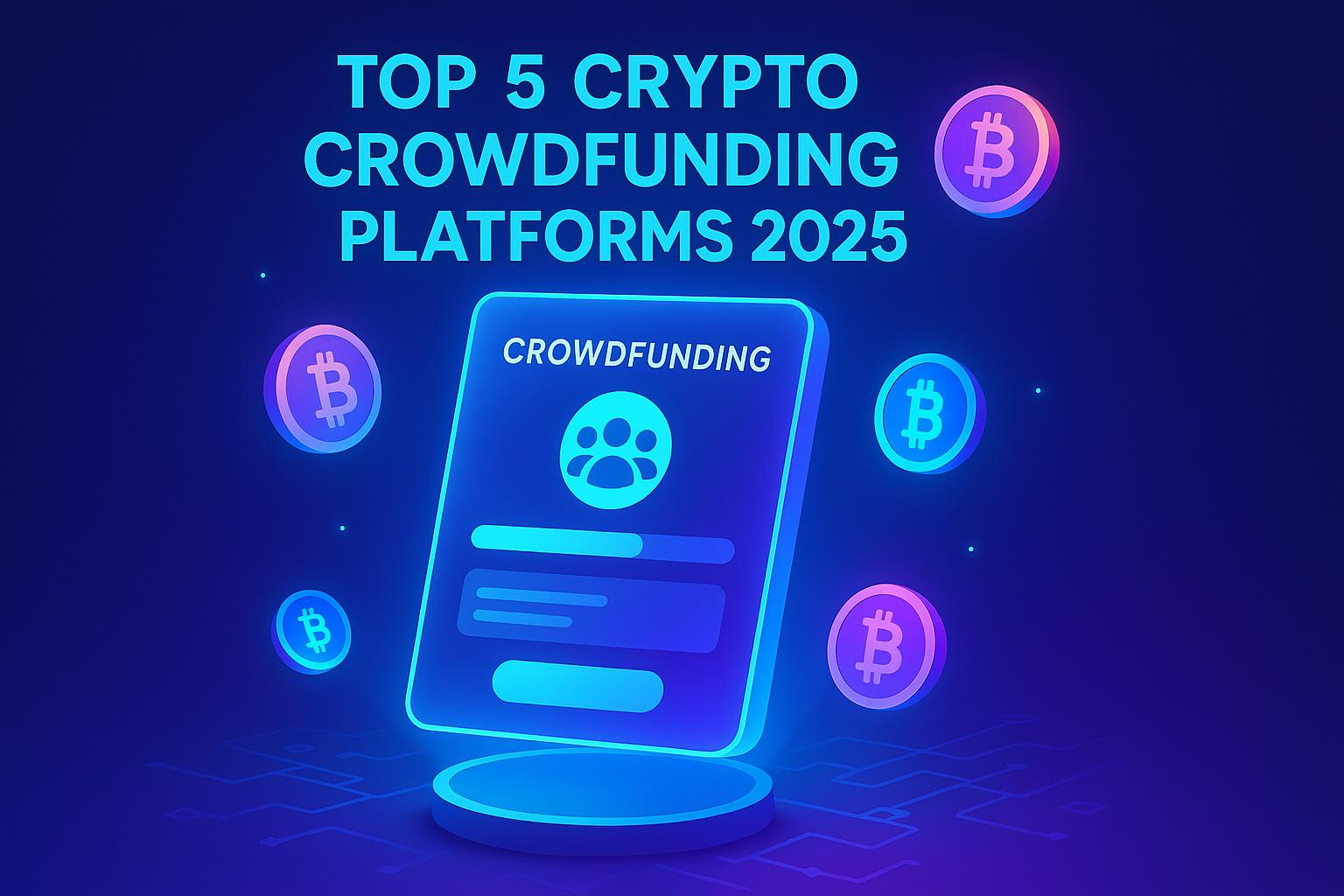
Crypto crowdfunding is reshaping how startups secure funding in 2025. By leveraging blockchain, entrepreneurs can connect with global investors quickly and transparently, offering tokens in exchange for cryptocurrency investments. Choosing the right platform is critical, with security, compliance, and user experience being key factors. Here's a quick look at the top platforms:
- ChainGPT Pad: A rising platform, though its details on features and security remain unclear.
- TrustPad: Focuses on decentralized project launches via token staking but may be complex for beginners.
- DuckDAO: Community-driven with governance tokens, but heavy reliance on Discord could deter new users.
- StartEngine: U.S.-regulated, combining traditional equity crowdfunding with crypto, offering strong investor protections.
- Aragon: Supports DAOs with blockchain-based governance and dispute resolution.
Each platform offers different strengths. Whether you're an investor or project creator, understanding these differences can help you make informed decisions.
1. ChainGPT Pad
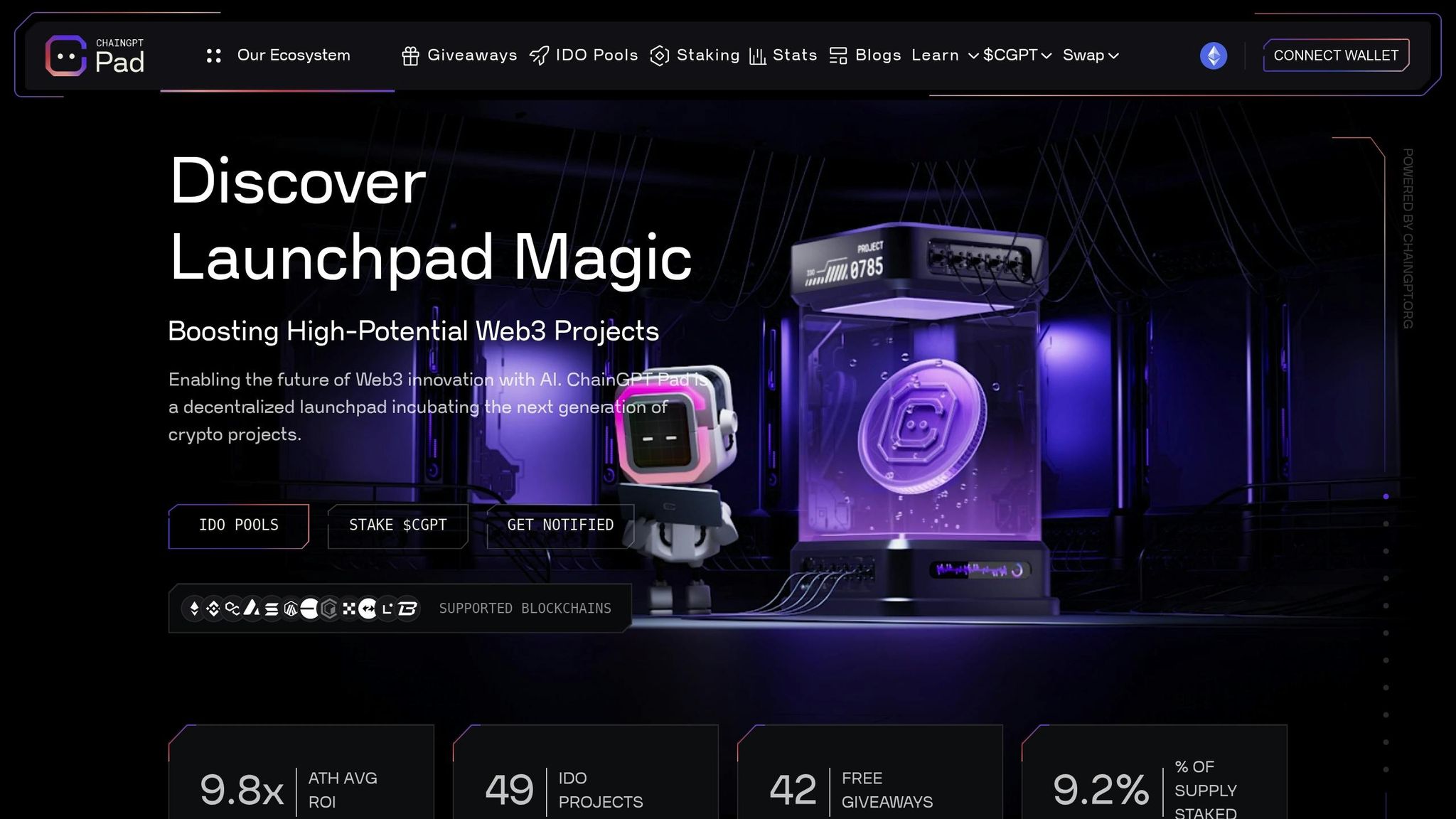
As crypto crowdfunding continues to grow in 2025, ChainGPT Pad has emerged as a prominent platform in the space. However, specifics about its security measures, regulatory compliance, fee structure, and overall user experience are yet to be confirmed.
For those looking to convert fiat currencies like USD into crypto effortlessly, Kryptonim offers a secure and straightforward solution. It eliminates the hassle of lengthy account setups, making transactions quick and user-friendly.
2. TrustPad
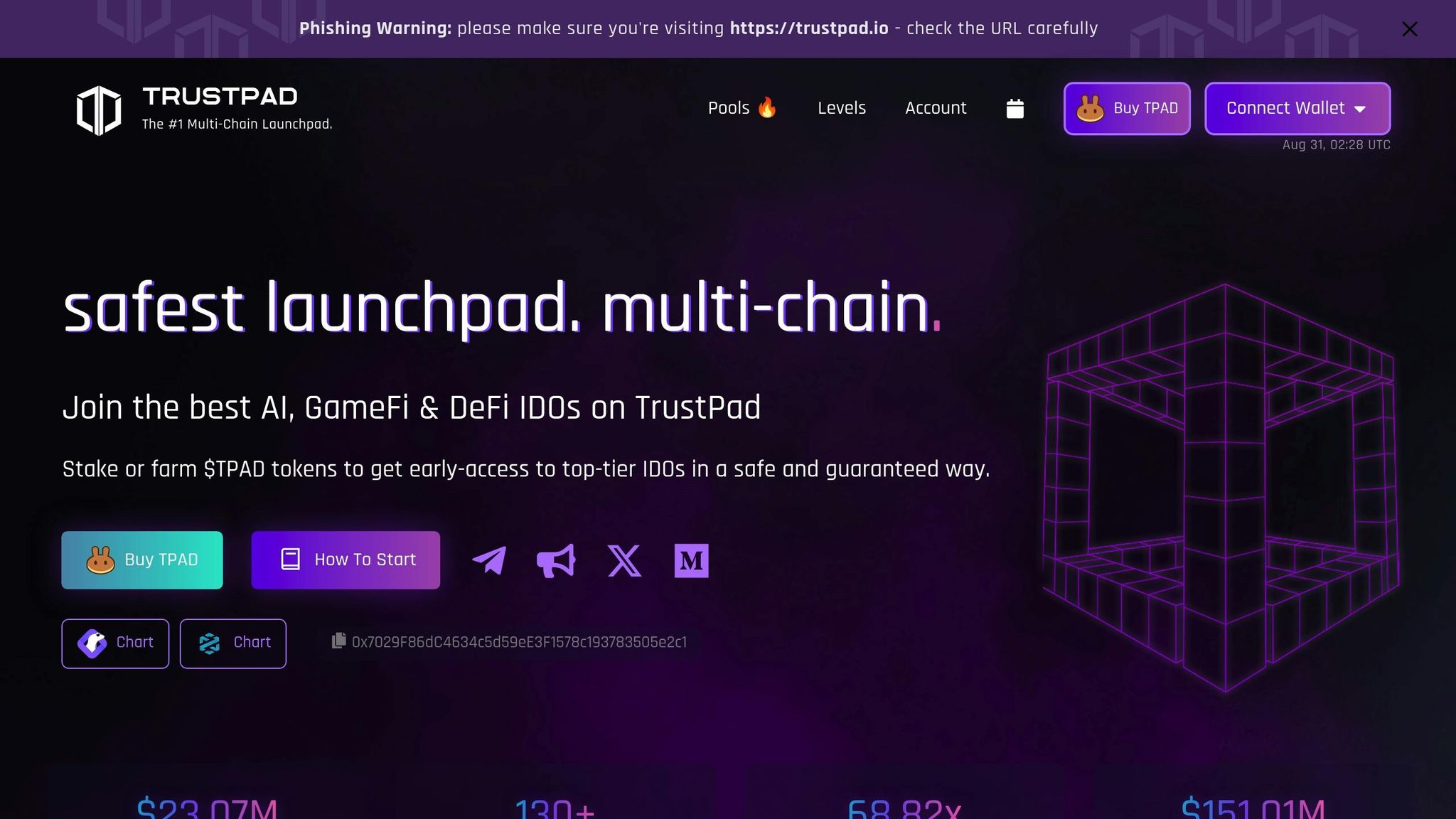
TrustPad is a decentralized launchpad that facilitates blockchain project IDOs (Initial DEX Offerings). To participate, users must stake $TPAD tokens, which serve as the gateway to funding opportunities.
Platform Security
TrustPad's security revolves around its decentralized design and robust smart contracts. The TPAD 2.0 migration introduced upgrades to its security framework, but publicly available details about audits, insurance policies, or third-party certifications are scarce.
Fees and Costs
Rather than charging transaction fees for each IDO, TrustPad requires users to stake $TPAD tokens. For lottery-based access, users need to stake a minimum of 3,000 $TPAD tokens. During the TPAD 2.0 migration, an "early claiming fee" was introduced for users converting their V1 tokens to V2 tokens before the set deadline.
For project creators, pricing structures are tailored individually and not disclosed publicly. Beyond costs, the platform's usability has a direct impact on user engagement.
User Experience
The platform is designed for users familiar with staking and DeFi concepts. Navigating through staking requirements, allocation tiers, and the lottery system can be challenging for beginners.
To ease the onboarding process, Kryptonim simplifies USD-to-crypto conversions, making it easier for new users to get started.
3. DuckDAO
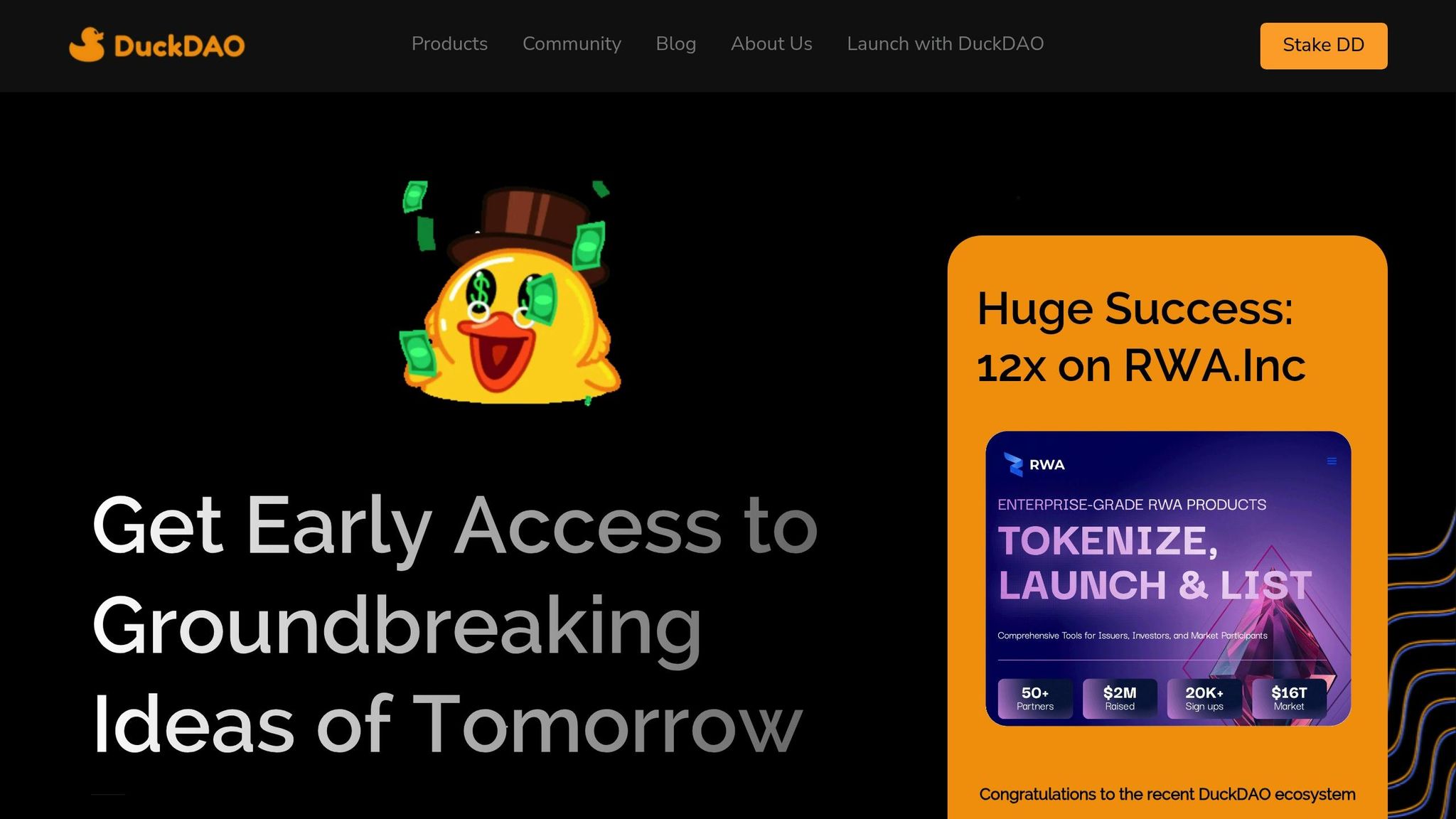
DuckDAO takes a unique, community-first approach to supporting early-stage projects, setting itself apart with its focus on governance and token utility.
DuckDAO functions as a community-driven incubator, blending crowdfunding with decentralized decision-making. Token holders play an active role by voting on which projects receive funding and support, giving the community significant influence.
Platform Security
Security on DuckDAO is rooted in decentralized governance and smart contract technology. Decisions about platform security are made collectively by the community, ensuring transparency. This approach highlights the importance of thorough research and vigilance for all participants.
Fees and Costs
DuckDAO operates on a membership model that requires holding $DUCK tokens. Additionally, the platform includes a revenue-sharing system, where project creators contribute tokens to sustain the community treasury.
User Experience
DuckDAO is tailored for users familiar with governance tokens and community voting processes. However, its heavy reliance on Discord for coordination might pose a learning curve for newcomers.
To make onboarding easier, new users can acquire $DUCK tokens through Kryptonim's simple fiat-to-crypto conversion system, streamlining the process for those just starting out.
4. StartEngine

StartEngine is an equity crowdfunding platform that operates under U.S. securities laws, making it a regulated way for both accredited and non-accredited investors to back blockchain projects. By combining traditional investment practices with crypto fundraising, it ensures a high level of compliance and security.
Regulatory Compliance
StartEngine adheres to strict U.S. securities regulations, providing investors with legal protections. Every project listed undergoes a rigorous review process, including audits and legal evaluations. Project creators are required to submit detailed disclosure documents, similar to those used in traditional investments. These documents include financial statements, business plans, and risk assessments, giving investors a clear picture of what they're supporting. However, participation is limited geographically, with most offerings available to U.S. residents and a few international investors.
Platform Security
Security on StartEngine follows the standards of the traditional financial sector rather than relying exclusively on blockchain technology. The platform uses strong encryption and holds investor funds in secure accounts until they're allocated to approved projects. Transactions are processed through established payment systems, and all users must go through standard Know Your Customer (KYC) and Anti-Money Laundering (AML) checks. While this approach offers familiar safeguards, it does result in slower transaction times compared to decentralized platforms.
Fees and Costs
StartEngine charges project creators a percentage of the funds raised, along with additional processing and administrative fees. These costs reflect the platform’s regulatory oversight and the extensive vetting process required for each project. Exact rates and fees can vary depending on the specifics of the project.
User Experience
The platform provides a traditional investment interface, complete with detailed project profiles and financial information. The investment process includes several verification steps and mandatory cooling-off periods, as required by securities laws. While this creates a slower, more deliberate experience compared to instant blockchain transactions, it offers a structured and transparent approach. For those new to crypto, StartEngine’s model can be paired with tools like Kryptonim to simplify fiat-to-crypto conversions.
5. Aragon
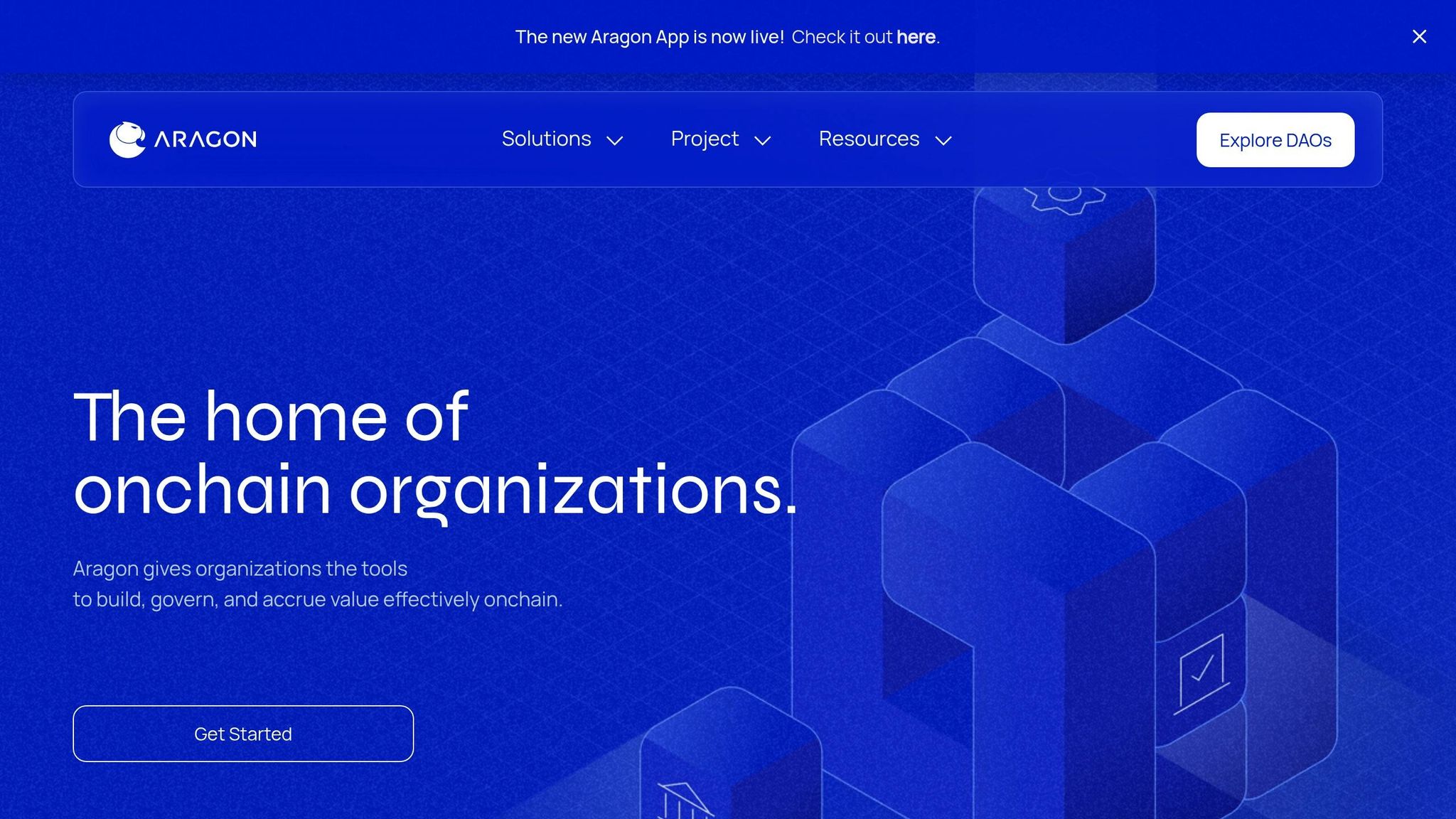
Aragon is a platform designed to support decentralized autonomous organizations (DAOs) and enable crypto crowdfunding through blockchain-based governance. It allows users to create and manage various types of entities - such as companies, open-source projects, NGOs, foundations, and hedge funds - while leveraging blockchain's security features and a decentralized court system for dispute resolution.
Platform Security
Aragon emphasizes a secure and adaptable framework for its users. One of its standout features is a virtual court system that uses decentralized methods to handle disputes and update jurisdictional norms as needed. This approach ensures that conflicts are resolved transparently and fairly within the platform.
Regulatory Compliance
Operating within a challenging regulatory environment, Aragon has structured its native token, ANT, as a governance tool. ANT holders can vote on DAO decisions, which helps it avoid being classified as a security under current interpretations. However, the SEC has not issued explicit guidance regarding ANT's status, and nearly 40% of DAOs still face legal uncertainties. While Aragon's decentralized model offers some protection against regulatory scrutiny, users should stay informed about the shifting global regulations surrounding DAOs. This legal framework aligns with Aragon's decentralized ethos, helping users navigate the complexities of compliance in an evolving landscape.
sbb-itb-0796ce6
Platform Comparison Table
Here's a quick look at the standout features of StartEngine:
| Platform | Platform Fees | Regulatory Status | Key Features | Best For |
|---|---|---|---|---|
| StartEngine | 7% + 2% equity (total 9%) | Reg CF and Reg A+ compliant | Secondary trading market, $100 minimum investment, 800,000+ users | Investors interested in regulated equity crowdfunding |
StartEngine is a well-established equity crowdfunding platform with a straightforward fee structure of 7% plus 2% equity. It complies with Reg CF and Reg A+ regulations, ensuring investor protections. With a low $100 minimum investment requirement and a user base of over 800,000, it caters to those looking for vetted startup opportunities. The platform has facilitated $900 million in startup funding and raised $85.62 million through Reg CF in 2024. Additionally, its 2023 acquisition of SeedInvest's assets strengthens its position as a reliable choice for traditional investors.
Conclusion
As we've explored, each crypto crowdfunding platform brings its own strengths to the table, with differences in security, fees, and overall user experience. By 2025, this space is evolving to meet the diverse needs of both investors and project creators. Platforms are designed to align with various investment strategies, offering unique opportunities for all participants.
The rapid pace of blockchain advancements has significantly improved fundraising by introducing greater transparency, stronger security, and broader accessibility. Models like ICOs, IEOs, STOs, and IDOs continue to reshape the way projects are funded and supported.
When selecting a platform, prioritizing security and compliance is essential. Look for platforms that offer transparent fee structures, strong protective measures, and adherence to regulatory standards. Other factors to weigh include minimum investment amounts, the size of the user base, and the platform's history of facilitating successful funding rounds.
Whether you're an investor seeking well-vetted opportunities or a project creator aiming to secure capital, the key lies in aligning your goals with the strengths of the right platform. The crypto crowdfunding sector is poised for further growth and diversification in 2025, opening up exciting new ways for investors and creators to collaborate on blockchain-driven projects.
As always, conduct thorough research and consult a financial advisor to ensure compliance with crypto crowdfunding regulations.
FAQs
What should I look for in a crypto crowdfunding platform in 2025?
When choosing a crypto crowdfunding platform in 2025, it’s crucial to prioritize security and regulatory compliance. Platforms that follow clear regulations and maintain transparency offer a safer environment for your investments, giving you peace of mind.
Look for platforms with intuitive interfaces and useful features like campaign management tools. These can make the process smoother for both project creators and backers, ensuring a more efficient experience. It’s also worth considering platforms that emphasize scalability and interoperability, allowing for seamless transactions and adaptability as the ecosystem evolves.
Lastly, focus on platforms that support forward-thinking and sustainable projects. These platforms often attract communities that share similar values and can contribute to long-term success.
What are the key security differences between TrustPad and DuckDAO, and what should investors consider?
TrustPad vs. DuckDAO: Security Approaches
When it comes to investor protection, TrustPad and DuckDAO follow distinct paths, each tailored to ensure security.
TrustPad emphasizes multi-chain compatibility and undergoes rigorous security audits to uphold the reliability of its platform. This focus on thorough evaluations helps build confidence in its infrastructure.
On the other hand, DuckDAO leans into decentralization, relying on smart contracts and community-driven governance. By prioritizing transparency and collective oversight, DuckDAO aims to strengthen its security measures.
For investors, it’s crucial to examine the audit history and smart contract reliability of any platform. TrustPad stands out for its comprehensive audits and multi-chain safeguards, while DuckDAO’s strength lies in its decentralized framework and community involvement. Always take the time to assess whether a platform’s security measures align with your expectations before making any financial commitments.
What legal and regulatory challenges might arise when using DAO-based crowdfunding platforms like Aragon?
Legal and Regulatory Challenges for DAO-Based Crowdfunding Platforms
DAO-based crowdfunding platforms, such as Aragon, face a host of legal and regulatory hurdles. A key challenge lies in the absence of clear legal recognition. Since DAOs often exist in a regulatory gray zone, adhering to local laws and international standards becomes a tricky and complex task. Adding to the difficulty is jurisdictional uncertainty - when participants are scattered across different countries, determining which laws apply can become a significant headache.
Beyond these legal ambiguities, other issues come into play, including governance disputes, concerns about transparency, and the potential for legal liability among participants. Regulators and courts are still in the process of figuring out how DAOs should be classified, which only deepens the uncertainty for those involved.
As the legal framework continues to shift, it’s crucial for users to stay updated on the latest developments. Seeking professional advice can be a smart move to navigate this evolving landscape with greater confidence.
